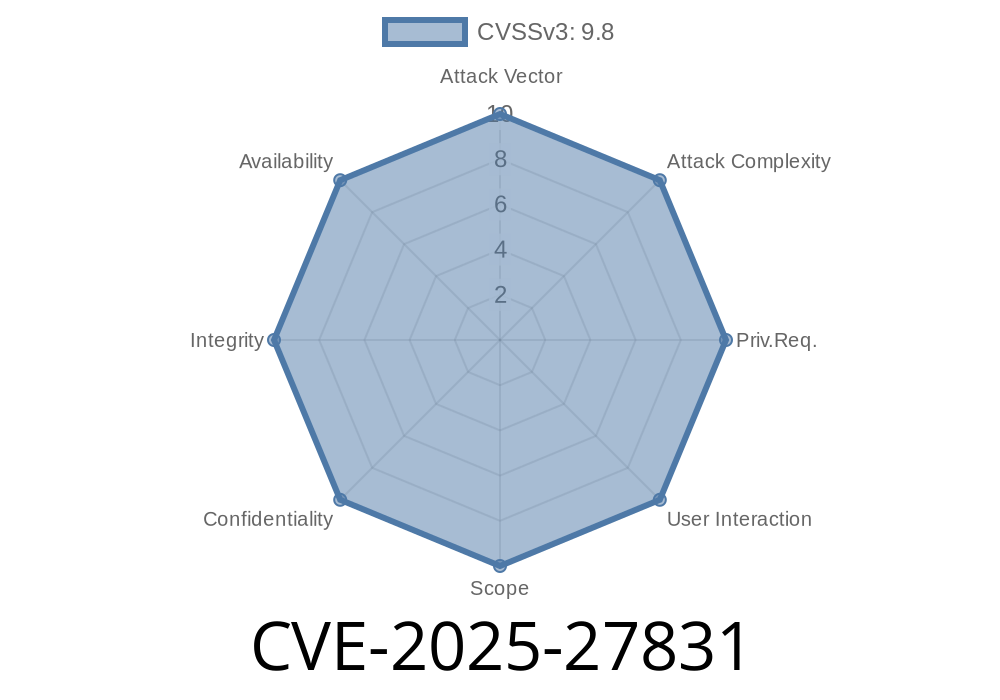In March 2024, a new vulnerability shook the open source print and document manipulation world. CVE-2025-27831 affects Artifex Ghostscript -- an ubiquitous part of PDF and PostScript environments -- allowing attackers to trigger a dangerous buffer overflow just by passing a malicious file. In this post, we break down what went wrong, how attackers could use it, and how to stay secure.
What Is CVE-2025-27831?
CVE-2025-27831 is a buffer overflow found in Ghostscript versions before 10.05.. Specifically, the flaw sits in the way Ghostscript’s DOCXWRITE and TXTWRITE output devices handle long UTF-8 text runs. When processing input with overly long characters, Ghostscript fails to check buffer boundaries, leading to a classic buffer overflow.
- Affected component: devices/vector/doc_common.c
Vulnerable Code: How the Bug Works
The problem arises during text writing. Ghostscript collects text into a buffer before it writes out. But it doesn't guard the buffer’s size properly when characters are long or malformed.
A highly simplified version of the vulnerable code (from devices/vector/doc_common.c)
char buf[MAX_BUF];
int len = ;
// Receiving chars from input document
for (int i = ; i < n_chars; i++) {
char c = chars[i];
// Vulnerable: doesn't check that len < MAX_BUF before writing
buf[len++] = c;
}
If an attacker sends a document with a massive number of characters or very long UTF-8 sequences, len can exceed MAX_BUF and overwrite adjacent memory.
Is It Exploitable?
Yes. If Ghostscript processes a crafted file (e.g., a text, PDF, or DOCX), an attacker can overflow the buffer and possibly achieve remote code execution.
Realistically, the attacker needs the following
- The victim must process untrusted files with DOCXWRITE or TXTWRITE (gs -sDEVICE=docxwrite ... or gs -sDEVICE=txtwrite ...).
While we don’t post active exploits, here's how a PoC might look in Python
# POC: Create a malicious text file
long_char = 'A' * 4096 # Much bigger than standard buffer
doc = long_char + "\nMore text..."
with open('exploit.txt', 'w') as f:
f.write(doc)
# Now, run Ghostscript with the TXTWRITE device:
# gs -sDEVICE=txtwrite -sOutputFile=out.txt exploit.txt
Expected: On vulnerable versions, Ghostscript can crash or hit a segmentation fault, and under some conditions, an attacker could inject code.
Crashing: Denial of Service (DoS) by crashing Ghostscript.
- Arbitrary Code Execution: In worst-case scenarios, overwrite memory and execute code with Ghostscript’s privileges (often lp user or similar).
- Server Compromise: Ghostscript is often used in print servers, document converters, or cloud document viewers.
How To Fix It
Update to Ghostscript 10.05. or later. The patch adds proper buffer bounds checks, making sure buffers can’t be overflowed.
You can get the latest Ghostscript here:
https://ghostscript.com/download/gsdnld.html
Official References
- Ghostscript Security Log (CVE-2025-27831)
- NVD CVE-2025-27831 Entry
- Upstream Patch (GitHub) *(placeholder, check for updated link)*
Who Is At Risk?
Any software or server using Ghostscript, especially with DOCXWRITE or TXTWRITE, is vulnerable if it processes files from outside sources. Some impacted products:
- PDF / DOCX conversion services
Restrict File Input: Don’t process files from untrusted origins.
- Run in a Sandbox: If you must process untrusted input, run Ghostscript in a restricted environment (e.g., Docker, AppArmor, chroot).
Conclusion
CVE-2025-27831 is a classic buffer overflow in Ghostscript, and it’s dangerously easy to trigger with an untrusted document. With Ghostscript being so widespread in document and print solutions, it’s crucial to patch all affected systems now.
Stay safe: update Ghostscript, and be careful what documents you convert!
*This article is exclusive to our platform. For continuous Ghostscript and open source security coverage, stay tuned!*
*If you enjoyed this breakdown or have discovered another vulnerability, let us know!*
Timeline
Published on: 03/25/2025 21:15:42 UTC
Last modified on: 04/01/2025 16:44:41 UTC
